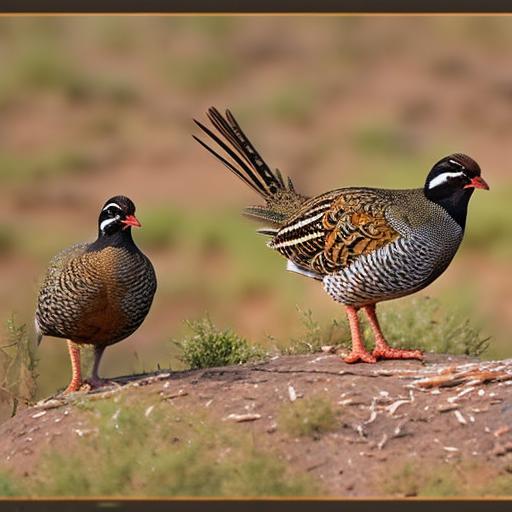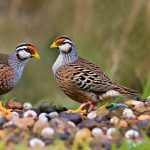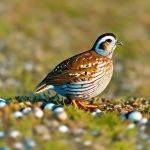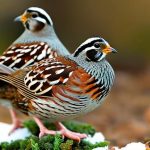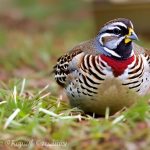Quails are small, ground-dwelling birds that are known for their social behavior and active nature. They are highly social birds and thrive in the company of other quails. In the wild, quails live in coveys, which are small flocks of birds that work together to forage for food and protect each other from predators. This social nature is important to consider when keeping quails in captivity, as they will need to be housed with other quails to thrive.
Quails are also known for their active nature and require plenty of space to move around and forage. They are ground-dwelling birds and spend much of their time foraging for insects, seeds, and vegetation. When kept in captivity, it’s important to provide them with a large outdoor space or an indoor enclosure with plenty of room to move around. Additionally, quails are known for their dust bathing behavior, which helps them keep their feathers clean and free of parasites. Providing a dust bathing area in their enclosure is essential for their overall well-being.
Key Takeaways
- Quails are social birds that require space to roam and dust bathe, and they prefer to be kept in groups.
- When choosing housing for quails, consider factors such as space, ventilation, and protection from predators.
- Quails in Zimbabwe require a balanced diet of commercial quail feed, supplemented with greens, grains, and protein sources.
- Regular health checks, proper sanitation, and vaccination are essential for preventing diseases in quails.
- Breeding quails require a ratio of one male to every four females, and proper nesting boxes for egg laying. Additionally, it is important to be aware of the legal requirements for keeping quails in Zimbabwe.
Choosing the Right Housing for Quails
When it comes to housing quails, there are a few key considerations to keep in mind. Firstly, quails require a secure enclosure that protects them from predators such as foxes, birds of prey, and domestic pets. The enclosure should have a solid roof and walls to prevent any potential threats from entering the space. Additionally, the flooring of the enclosure should be covered with a layer of soft bedding material such as straw or wood shavings to provide a comfortable and clean environment for the quails.
In terms of space requirements, it’s important to provide at least 1 square foot of space per quail to ensure they have enough room to move around and forage. If keeping a larger number of quails, a spacious outdoor pen with access to fresh grass and vegetation is ideal. However, if space is limited, indoor enclosures can also be suitable as long as they are well-ventilated and provide enough room for the quails to move around comfortably. Additionally, providing hiding spots such as shrubs or small shelters within the enclosure can help quails feel secure and reduce stress.
Feeding and Nutrition for Quails in Zimbabwe
Feeding quails a balanced diet is essential for their overall health and well-being. In the wild, quails primarily feed on a diet of seeds, insects, and vegetation. When kept in captivity, it’s important to replicate this natural diet by providing them with a high-quality game bird feed that is specifically formulated for quails. This feed should contain a balanced mix of grains, seeds, and protein sources to meet their nutritional needs.
In addition to commercial feed, quails can also benefit from supplemental treats such as mealworms, fresh fruits, and vegetables. These treats can be offered in moderation as a source of enrichment and variety in their diet. It’s important to provide fresh, clean water at all times, as quails can quickly become dehydrated if they do not have access to an adequate water source.
Health and Disease Management for Quails
Maintaining the health of quails is crucial for their overall well-being and productivity. Regular health checks should be conducted to monitor the condition of the birds and identify any potential issues early on. Common health problems in quails include respiratory infections, parasites, and nutritional deficiencies. It’s important to work with a veterinarian who has experience with poultry to develop a health management plan for your quails.
Preventative measures such as regular cleaning and disinfection of the enclosure, providing a balanced diet, and minimizing stress can help reduce the risk of disease in quails. Additionally, practicing good biosecurity measures such as limiting exposure to wild birds and quarantining new birds before introducing them to an existing flock can help prevent the spread of disease.
Breeding and Reproduction of Quails
Quails are prolific breeders and can start laying eggs as early as 6-8 weeks of age. When breeding quails, it’s important to provide them with a suitable nesting area that is dark, quiet, and secluded to encourage egg laying. The nesting area should be filled with soft bedding material such as straw or wood shavings to provide a comfortable environment for the birds.
Quail eggs typically take around 17-18 days to hatch, and the chicks are precocial, meaning they are born with their eyes open and are able to feed themselves shortly after hatching. It’s important to provide the chicks with a warm brooding area and access to chick starter feed to support their growth and development. Additionally, providing a secure space for the chicks to grow and mature is essential for their safety and well-being.
Legal Considerations for Keeping Quails in Zimbabwe

In Zimbabwe, there may be specific regulations and legal considerations regarding the keeping of quails that need to be taken into account. It’s important to research and understand any local laws or regulations related to keeping quails before starting a quail keeping operation. This may include obtaining permits or licenses from relevant authorities, adhering to zoning regulations, and complying with animal welfare standards.
Additionally, it’s important to consider the ethical implications of keeping quails and ensure that their welfare needs are met at all times. This includes providing them with a suitable living environment, access to proper nutrition and veterinary care, and ensuring that they are not subjected to any form of cruelty or neglect.
Tips for Successful Quail Keeping in Zimbabwe
To ensure successful quail keeping in Zimbabwe, there are several tips that can be followed. Firstly, it’s important to start with a well-researched plan that takes into account the specific needs of quails in terms of housing, nutrition, and health care. This may involve consulting with experienced quail keepers or poultry experts to gain valuable insights and advice.
Additionally, investing in high-quality housing and equipment, such as secure enclosures, feeders, and waterers, can help create a safe and comfortable environment for the quails. Regular monitoring of the birds’ health and behavior can help identify any potential issues early on and prevent them from escalating into more serious problems.
Furthermore, networking with other quail keepers or joining local poultry associations can provide valuable support and resources for new quail keepers in Zimbabwe. Sharing experiences and knowledge with others in the industry can help foster a sense of community and provide opportunities for learning and growth.
In conclusion, understanding the behavior and needs of quails is essential for successful quail keeping in Zimbabwe. Providing suitable housing, nutrition, and health care is crucial for the well-being of the birds. Additionally, being aware of legal considerations and following best practices can help ensure a positive and ethical approach to keeping quails in Zimbabwe.
If you’re interested in learning more about raising quails in Zimbabwe, you may also want to check out Poultry Wizard’s article on converting a shed into a chicken coop. This informative piece provides valuable insights into creating a suitable living space for poultry, which can be adapted for quails as well. You can find the article here.
FAQs
What are quails?
Quails are small ground-dwelling birds that are often kept for their eggs and meat. They are known for their fast growth and high egg production.
What do quails eat?
Quails are omnivorous and eat a diet that consists of seeds, grains, insects, and small invertebrates. They can be fed a commercial quail feed or a mixture of grains and protein sources.
How do I house quails in Zimbabwe?
Quails can be housed in simple cages or aviaries that provide protection from predators and the elements. The housing should be well-ventilated and provide enough space for the quails to move around comfortably.
What are the ideal conditions for keeping quails in Zimbabwe?
Quails thrive in moderate temperatures and require protection from extreme heat or cold. They also need access to clean water and a balanced diet to stay healthy.
How do I care for quails in Zimbabwe?
Caring for quails involves providing them with a clean and comfortable living environment, regular access to food and water, and monitoring their health and behavior for any signs of illness.
Can I keep quails for eggs and meat in Zimbabwe?
Yes, quails are commonly kept for their eggs and meat in Zimbabwe. They are known for their high egg production and can be a valuable source of protein for small-scale farmers.
Meet Walter, the feathered-friend fanatic of Florida! Nestled in the sunshine state, Walter struts through life with his feathered companions, clucking his way to happiness. With a coop that’s fancier than a five-star hotel, he’s the Don Juan of the chicken world. When he’s not teaching his hens to do the cha-cha, you’ll find him in a heated debate with his prized rooster, Sir Clucks-a-Lot. Walter’s poultry passion is no yolk; he’s the sunny-side-up guy you never knew you needed in your flock of friends!

